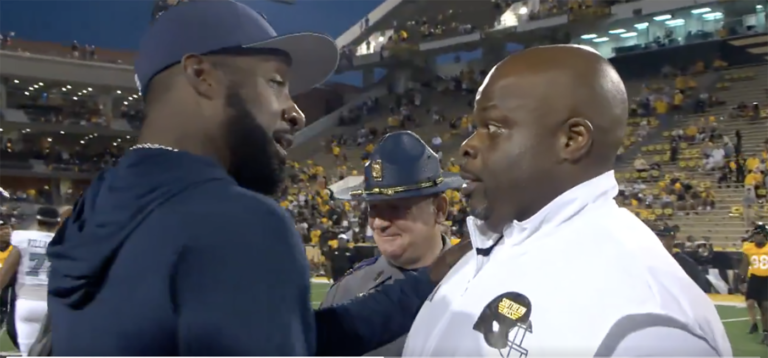In early 2025, Southern Miss hired Charles Huff as its first Black head football coach. Minority enrollment reached an all-time high—more than double what it was in the 1990s. It was tempting to believe Mississippi had finally turned a corner, that a new chapter had begun.
But right before the recent Southern Miss and Jackson State game, a so-called fan brought the past into the present by posting a racist “dos and don’ts” list on the Eaglepost Facebook page, sparking outrage across social media. The rivalry between Southern Miss and JSU goes back decades. This wasn’t that. This was hate.
For the last decade, Black students at Southern Miss have said their PWI “feels like an HBCU.” The clap-back is always swift. Jackson State students remind Southern Miss that it isn’t just about demographics. HBCUs were created to educate Black students who were locked out of white institutions; no amount of shifting enrollment rewrites that DNA.
The Southern Miss student body, its culture, and its conversations are changing. But still, the HBCU running joke speaks to something that, for some, feels sinister. The claim that Southern Miss “feels like an HBCU” misses the mark and verges on parody. With DEI initiatives being erased across higher education, you can’t simply borrow an identity forged in exclusion. However, institutions that came from it and have been carrying that weight for generations are still underfunded and under siege.
Gameday Culture
Gameday at The Rock is theater as much as it is sport. The smell of barbecue drifts through the parking lot. Kids in rival jerseys laugh and play together in the yard while music plays loudly and line dances form. It’s Mississippi’s brand of church: ritual, community, and spectacle. Fans travel from Hattiesburg and Jackson, as well as families divided between black and gold and blue and white, to witness a rivalry that has been ongoing on this field since 1987. It’s an exciting feeling that never goes away.
Then the halftime show brought something that the Facebook trolls could never have imagined. Unity.
First, Jackson State’s Sonic Boom of the South faced the crowd. Then, Southern Miss’s Pride of Mississippi swung in, linking the “S” in JSU and USM with their formations. Suddenly, the unanticipated event occurred. They line danced as one to Cupid’s “Flex.”
It gave me chills, a moment I’ll never forget.
For me, this rivalry isn’t theoretical. It’s family. My father, Dillet Montgomery, played basketball at Southern Miss, and my mother, Rev. Rosa Montgomery-Barron, went there too. My aunt, Phyllis Smiley, graduated from Jackson State. My sister, Delyse, played softball there, and my cousins, Marcus Jr. and Adrian Craft, both played baseball in blue and white. Yes, I’m name-dropping because black and gold run through our blood. Blue and white do too.
That’s why one ugly Facebook post will never define the fan base for me. I grew up on stories of my father arriving at a racist Southern Miss in the late 1970s, when the campus was hostile ground for Black athletes. By the time I came of age during the Jeff Bower years, the culture of Southern Miss football had already begun to shift.
With protests and unrest rising across the country, and Mississippi’s own leadership failing to meet the moment, this was not the time for a racist stunt. Fans come to these games to find joy. The city is proud to host in-state matchups, especially when Mississippi’s HBCUs take the field.
One fan tried to hijack that joy, but the universities refused. Before kickoff, both presidents, Jackson State’s Denise Gregory Jones and Southern Miss’s Joseph S. Paul, released a joint statement affirming unity over division.
The Bigger Legacy
College football has always been a safe space for me and for so many Mississippians. I love the towns that raised me: Hattiesburg, Petal, Ellisville, Laurel, and Jackson. But I don’t love the racism that refuses to die, that insists on showing up uninvited to every gathering, like an uncle who doesn’t know when to leave. That Facebook post was meant to cloud a historic moment. Instead, it threw the spotlight on it.
Coach Huff’s hiring was historic for Southern Miss. He isn’t just another coach climbing the ranks. HBCU culture shaped him. Coach knows he stepped into a position that few Black men ever get to hold.
Huff downplayed the big win after it happened. Instead, he highlighted his friendship with Jackson State’s T.C. Taylor and discussed putting Mississippi football on the map. But make no mistake: this victory was history. Huff broke Southern Miss’s losing streak, did it against an HBCU, and did it in front of a crowd that looked more like him than the sidelines usually do.
While Brett Favre’s welfare scandal continues to cast a shadow over Southern Miss, Coach Huff is making headlines in a different way. The narrative can change—if we let it. Football, the South’s true religion, has been far too slow to allow Black men into the pulpit. Coach Huff has the potential not only to win games but also to reshape what leadership in Mississippi football means.






